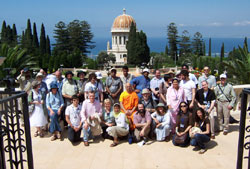Magdalen Lambkin
Today was a very different day from yesterday, where in Hebron we witnessed the pain and fear that comes from the complete separation of communities who should be neighbours but instead often fail even to recognise the humanity of the other. By contrast, our first stop today was Tabeetha school in Jaffa, a Church of Scotland run school where young people of various religious and ethnic backgrounds are are taught together with the view to promoting reconciliation in the community of Jaffa. Christian, Muslim, Jewish, Buddhist and Jain students spend their days from pre-school until the age of 18 together and are not even separated for religious studies class where they learn about each other's faiths.
 |
I wondered if, although the students were taught together in class, they separate themselves off in their recreation time. The bright and very enthusiastic head boy of the school assured me, however, that there are no such divisions. They spend all their time together as a class, he said, and honestly see each other as individuals, certainly not as 'the Muslim boy' or 'the Jewish girl'.
This seems to be a result of the combination of small class sizes (max 24 in a class), the inspirational and clearly well loved teaching staff, and the school's commitment to reconciliation. In this atmosphere, close and lasting friendships develop across religious and political divides, friendships which would be impossible in other parts of Israel and the Palestinian territories.
Feeling elated after hearing of the success of integrated education we returned to the bus and made our way to Haifa to the Shrine of the Bab, the forerunner of Baha'u'llah, the founding prophet of the Baha'i faith. It was wonderful to join with Maureen and Justin, our Baha'i delegates, in visiting their sacred site on what was for them a holy day - the anniversary of the death of the Bab, who was martyred in Persia in 1850.
The beautiful and peaceful terraced gardens and the shrine itself are open to all and as our guide shared with us the vision of Baha'u'llah, I felt that he had a poignant message for us today who are so often told, both explicitly and in ways more subtle, that we are in an era of a 'clash of civilisations'. Baha'u'llah wrote of humankind:'Ye are the fruits of one tree and the leaves of one branch. Deal ye with another with utmost love and harmony with friendliness and friendship.'
Tabeetha school, like our group, will I hope, serve as an example of the real possibility of living according to such a message, which is present in all our religions.
Finally we met with the Chief Rabbi of Haifa who is himself very active in interfaith work and spoke of both the value and viability of co-existence. "The art of dialogue," he said, "is to listen," and I felt how important it is that this simple but crucial truth be expressed with such feeling by a man of his position and stature. Our short meeting came to an end with a some heartfelt words from our Sheikh from Glasgow, Ruzwan, who expressed thanks for the Rabbi's thoughtful words and message of hope.
As with every other day, the experience of visiting holy places and meeting with these exceptional people was greatly enriched by the fact that we were experiencing it all with our new friends, whose varying perspectives help us to see more deeply into the complicated nature of the conflict here, which is all too often glossed over by our media back home.
Magdalen Lambkin is a PhD candidate in Inter-faith Studies. She is a Roman Catholic member of the Scottish Inter-faith Council.